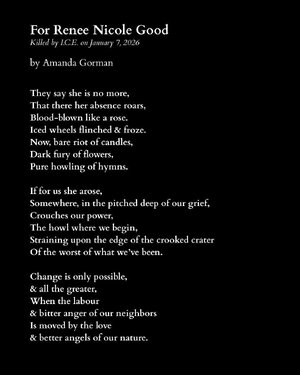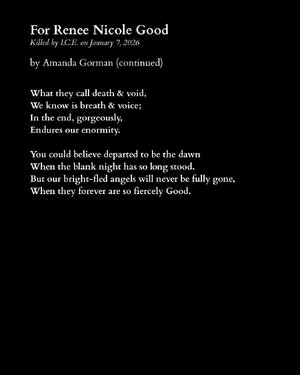donbosco
Legend of ZZL
- Messages
- 6,666
Appropriate since the OP on this thread was Sandberg...
Chicago
By Carl Sandburg
Hog Butcher for the World,
Tool Maker, Stacker of Wheat,
Player with Railroads and the Nation's Freight Handler;
Stormy, husky, brawling,
City of the Big Shoulders:
They tell me you are wicked and I believe them, for I have seen your painted women under the gas lamps luring the farm boys.
And they tell me you are crooked and I answer: Yes, it is true I have seen the gunman kill and go free to kill again.
And they tell me you are brutal and my reply is: On the faces of women and children I have seen the marks of wanton hunger.
And having answered so I turn once more to those who sneer at this my city, and I give them back the sneer and say to them:
Come and show me another city with lifted head singing so proud to be alive and coarse and strong and cunning.
Flinging magnetic curses amid the toil of piling job on job, here is a tall bold slugger set vivid against the little soft cities;
Fierce as a dog with tongue lapping for action, cunning as a savage pitted against the wilderness,
Bareheaded,
Shoveling,
Wrecking,
Planning,
Building, breaking, rebuilding,
Under the smoke, dust all over his mouth, laughing with white teeth,
Under the terrible burden of destiny laughing as a young man laughs,
Laughing even as an ignorant fighter laughs who has never lost a battle,
Bragging and laughing that under his wrist is the pulse, and under his ribs the heart of the people,
Laughing!
Laughing the stormy, husky, brawling laughter of Youth, half-naked, sweating, proud to be Hog Butcher, Tool Maker, Stacker of Wheat, Player with Railroads and Freight Handler to the Nation.
Hoodlums by Carl Sandburg
I AM a hoodlum, you are a hoodlum, we and all of us are a world of hoodlums—maybe so.
I hate and kill better men than I am, so do you, so do all of us—maybe—maybe so.
In the ends of my fingers the itch for another man’s neck, I want to see him hanging, one of dusk’s cartoons against the sunset.
This is the hate my father gave me, this was in my mother’s milk, this is you and me and all of us in a world of hoodlums—maybe so.
Let us go on, brother hoodlums, let us kill and kill, it has always been so, it will always be so, there is nothing more to it.
Let us go on, sister hoodlums, kill, kill, and kill, the torsoes of the world’s mother’s are tireless and the loins of the world’s fathers are strong—so go on—kill, kill, kill.
Lay them deep in the dirt, the stiffs we fixed, the cadavers bumped off, lay them deep and let the night winds of winter blizzards howl their burial service.
The night winds and the winter, the great white sheets of northern blizzards, who can sing better for the lost hoodlums the old requiem, “Kill him! kill him!…”
Today my son, to-morrow yours, the day after your next door neighbor’s—it is all in the wrists of the gods who shoot craps—it is anybody’s guess whose eyes shut next.
Being a hoodlum now, you and I, being all of us a world of hoodlums, let us take up the cry when the mob sluffs by on a thousand shoe soles, let us too yammer, “Kill him! kill him!…”
Let us do this now … for our mothers … for our sisters and wives … let us kill, kill, kill—for the torsoes of the women are tireless and the loins of the men are strong.
Chicago, July 29, 1919.


